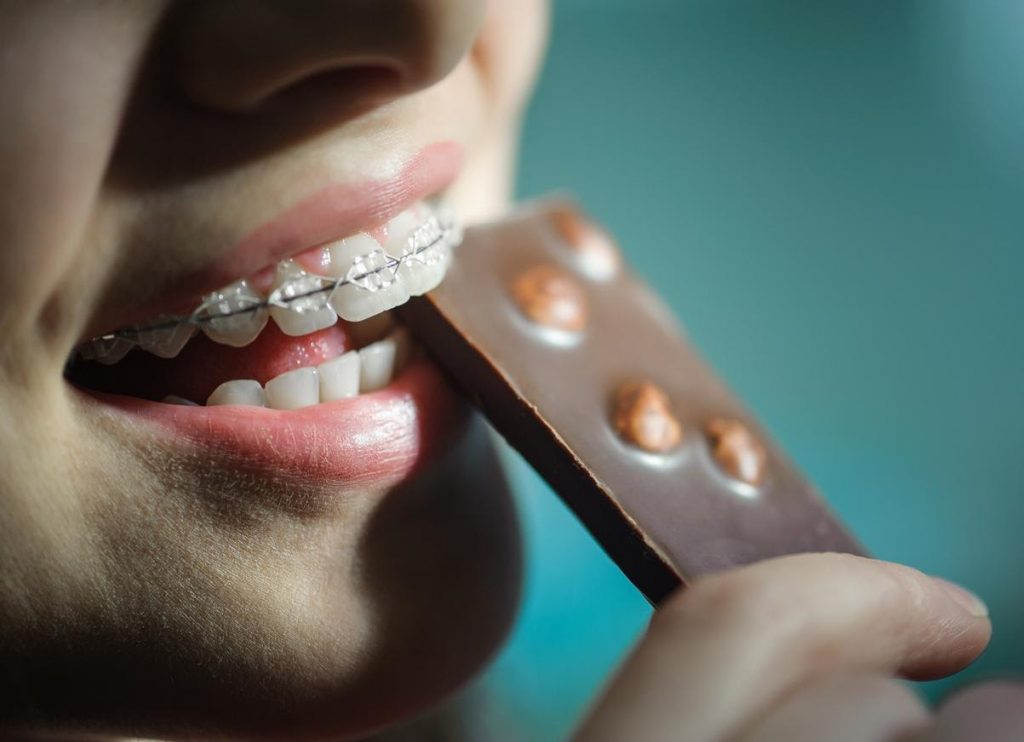
If you have braces or have a child with braces you probably already know that daily brushing is important. However, there is a lot more to keeping a mouth healthy while wearing braces. The more you know about what causes tooth decay and gum disease and how to prevent it, the better. So let’s see how you fare on the oral hygiene quiz for braces below. Take the quiz and then check your answers with the ones we give below. But no peeking first!
Oral Hygiene Quiz
- Which food is worse for causing cavities, a chocolate bar or potato chips?
- Which fruit is better for your mouth while wearing braces, a banana or an apple?
- Does wearing braces increase my risk of gum disease?
- Can I floss while wearing braces?
- Can braces discolor my teeth?
- How often do I need to brush my teeth with braces?
- Can I eat while wearing Invisalign braces?
- Can I drink while wearing Invisalign braces?
- Should I take vitamins while wearing braces?
Answers
- Potato chips. While neither a chocolate bar nor potato chips are great for health, potato chips are more likely to stick to your teeth than a chocolate candy bar so there is more chance of potato chips causing tooth decay. But, beware of any foods that stick to your teeth and braces, such as bread, sticky candies, cookies, etc.
- A banana. Here is a sample chart of foods ok to eat and foods to avoid with braces:
| Foods You Can Eat | Foods to Avoid |
| Cooked Vegetables | Raw hard vegetables e.g. carrots, celery |
| Soft fruits e.g. bananas, avocados | Hard fruits e.g. apples, raw coconut |
| Scrambled eggs | Nuts |
| Oatmeal | Chewy candy |
| Soups | Hard candy |
| Yogurt | Pretzels |
| Mashed potatoes | Chips |
| Soft cheeses | Chewing gum |
| Soft desserts e.g. puddings, Jello | Popcorn |
- Yes. Patients who wear braces are more susceptible to gum disease. Braces consist of metal bands, wires, and brackets that are bonded to the teeth. With so many components, it can be challenging to clean hard-to-reach areas. As a result, plaque accumulates along the gum line and around the brackets. This increases the risk for gum disease.
- Yes. Although flossing with your braces may be more difficult, it will help you get rid of food that may get trapped inside your braces and between your teeth. When flossing with braces, it is best to use waxed floss with a floss threader. This will help the floss slip between each tooth without catching on your braces. Gently slide the floss up into the gum line of both teeth before removing the floss and threader and going to the next tooth.
- No. It is not the braces themselves that discolor your teeth but your teeth can get discolored while wearing braces. Actually what happens is the braces can trap food which can cause a buildup of bacteria. The bacteria causes plaque to form. However, you can help prevent discoloration by brushing and flossing regularly and keeping your regular dental cleanings to remove plaque.
- 4 times a day. You should brush and rinse your teeth after each meal and then again before you go to bed.
- No. While the aligner is durable and strong, you should remove it before you eat as the chewing action inside your mouth can break, crack, or distort the aligner.
- No. Fluids can settle inside the aligner. Especially if the fluids are acidic, such as a soda drink. The acids can wear away tooth enamel. Also, hot drinks can damage your Envisalign®
- Yes. Proper nutrition and getting enough vitamins are vital for keeping your body healthy. While we don’t hear much anymore of Scurvy (a disease from severe lack of Vitamin C), bleeding gums can still be a symptom of a deficiency of Vitamin C and also a symptom of a deficiency of Vitamin D.
So how did you do? We hope this quiz helped you to learn more about taking care of your teeth. Proper oral care is important to keeping a healthy mouth. Be aware of signs of gum disease so this doesn’t happen to you.
Symptoms of Gum Disease
Anyone can get gum disease. Therefore, it is important to know the signs:
- Red, swollen or tender gums or other pain in your mouth.
- Bleeding while brushing or flossing.
- Receding gums.
- Sores in your mouth.
- Persistent bad breath.
If you have any questions consult your dentist. You can also contact us to make an appointment. Keeping your regular appointments is the safest bet to keeping a healthy mouth.
Sincerely,
Dr. David McDonough
& the McDonough Orthodontics Team
